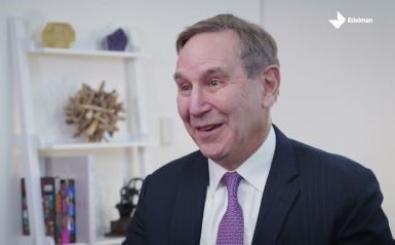Perhaps this scenario is familiar to you:
"We're running three events this year and need at least 15 MEPs to attend. So far, only one has signed up. What do I do?"
I hear it all the time.
Brussels is a city where a huge amount of organizations try to host events that look very similar: they're covering similar topics, they feature similar speakers and, crucially, they're trying to get the same group of people to show up.
It's a basic issue of supply and demand.
Targeting key audiences online
Policymakers exist in an ecosystem that you can trace online.
There are the primary policymakers themselves and their staff. There are the civil servants and elected officials who have to be recruited to push a policy through. Then you have the think tanks, academics, trade groups and NGOs who generate a lot of the raw fuel for policy. And then there is the circle of journalists, critics, commentators and (for some issues) activist groups who try to push attention on a policy from the outside.
Those are a lot of moving parts for policymakers to deal with. And they do that, at least in part, online.
88.8% of MEPs now actively use social media, with 496 on Twitter and 520 on Facebook[1].
Either they or their staff use it to seed particular points of views, bolster relationships with others who share their stance and get themselves in front of the journalists that practically live on Twitter[2].
Getting in front of your target audiences online is a question of messaging and targeting.
First and foremost, you need to be on-message with your social outputs, creating a steady drumbeat of event related content. Tell people the event is happening, tell them to register for it, and ask them to share it once they've registered. If you have speakers who work with them or know them, get them to post about the event as well - people are more likely to take advice from a trusted peer than just about anybody[3].
Don't be afraid to tell them over and over because most of the time people won't be scrolling on your actual feed - your messages are part of their feed, and you don't know exactly when they'll be online. Keep trying!
As with content marketing, you can test messages to see what works best for your particular audiences.
In terms of targeting, there are two broad methods:
- Organic. Don't be shy to tag the people you want at the event in posts about the event - that guarantees they at least see it. Spend 30 minutes each morning reading posts from your key targets - is there anything you can respond to or share? Any way of popping up in their notifications helps get you on the radar.
- Paid. Facebook, Twitter and LinkedIn have built-in platforms for serving your content to the people you want. The budget for social media promotion is surprisingly low (and flexible) - you can get decent results with just a few hundred Euros.
If you keep this advice in mind you're much more likely to get the people you want at your event.
But I always tell clients that their KPIs for events can go much further than who happens to show up on the day.
Events can get a lot more mileage
It's hard to justify the ROI of a one-and-done event.
Concentrating entirely on getting the right people there, on time and engaged means missing out on a lot of the benefits a high-level event can give you.
The only people who are getting your message are the people attending the event itself. What if a key attendee gets sick on the day? Or your speaker tells you they're double-booked at the last minute? Or the Metro gets unexpectedly shut down because of a security warning[4]?
It doesn't matter how well prepared you are, events always throw up unexpected wrinkles. If you don't build in other ways for people to access the ideas you want to present you're missing a trick.
Even if, by some miracle, everything works out, a flawlessly executed flagship event in Brussels is only likely to involve a few hundred people. That's not a lot of audience for an awful lot of effort.
By broadening the reach of your messaging you keep your existing audiences engaged, capitalize on the attention the event is getting and create content that builds your SEO presence for all the keywords associated with your thought leadership platform.
We generally start clients with this overview slide:

If you're doing all five then your event is going to last longer than a single day and, even more importantly, go further than the people in the room.
There is a lot of pressure in Brussels to deliver high profile events attended by high level policymakers. The problem is every other public affairs team is trying to do the same thing, often on the same day. Incorporating your event strategy into a broader thought leadership platform means what happens on the day isn't the be all and end all - it's about how the event contributes to your reputation.
Ultimately, that's the real aim. (It can be easy to forget that as you struggle to get those elusive MEPs to show up).
And that's where scale matters. The amount of high-level people actively using social media to track the news, discuss talking points and share information is enormous - just ask Rutger Bregman.
Bregman made a point at Davos in 2019 about tax avoidance which was delivered to a crowd of the most powerful people on earth. That probably helped his reputation. But a tweet containing his soundbite was retweeted 47000 times immediately after Davos and reported on by dozens of major media outlets - that's what pushed him from just another Ted fellow to a highly sought after voice on global economics[5].
The long-tail benefit
Search engine optimization (SEO) is a strangely under-appreciated tool in the world of public affairs.
It doesn't matter how smart, easy to implement and inexpensive your policy proposals are if nobody can find them (this is why I constantly tell people not to post their best ideas in PDF form).
There is a lot to say on the subject but let's first consider the simple facts: Google receives 63,000 per second on any given day[6]. That includes policymakers, their assistants, journalists researching a topic, your competitors and everybody in between. We all use search as a research tool. Every day. Multiple times a day.
If your online content isn't working to capture that traffic it might as well not be there. I don't care how good your online promotion work is, nothing can beat the sheer volume, reach and longevity of the Google search[7].
So how can public affairs people make their content more searchable? That is a complex subject for another article but there are two basic areas to focus on:
- Creating content that heavily features the keywords (i.e. search terms) your audiences use.
- Getting other people to link back to your website.
Events are a useful trigger for doing both.
The name of your event is likely to be related to your core interests, so publishing an event promotion page with the same title not only makes sense to the people you send a link to, it shows Google that those core interests are something available on your website.

Think of event SEO as an exercise in leaving clues for search engines that you're talking about a particular subject. Every clue helps.
Google wants to put the best, most helpful content at the top its searches. One of the ways it can assess how good content is is by seeing if other websites reference your content with hyperlinks - if the BBC, FT and Politico all reference a study, it's probably a respected and worthwhile study.
Events give you an opportunity to get lots of references. You may be co-hosting the event and can do quid pro quo by linking each other. Many speakers list their appearances on their websites, as do their employers. Any sponsors or promotion partners are also likely to be interested. There are event listing sites for what's coming in Brussels that compete to have the most complete list of what's going on.
All these people have good reason to link to your content - make sure you reach out to them.
After the event, write it up for anybody who missed out and send it to not only the registration list but to all the speakers, co-hosts and sponsors to link back to. That's another round of references to your website, focused on keywords that you want to be known for.
Online event promotion takeaway
Make sure your promotion strategy is both long-term and integrated - use every tool you have, online and offline.
Events are part of a broader strategy of establishing your organisation as a trusted leader in your area of expertise. It can help bring people together, showcase your thought leadership and act as a tentpole for a campaign - but allowing the campaign to end along with the event is a huge missed opportunity.







